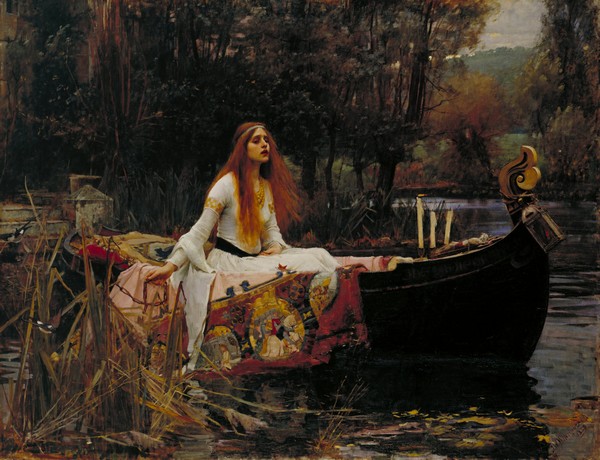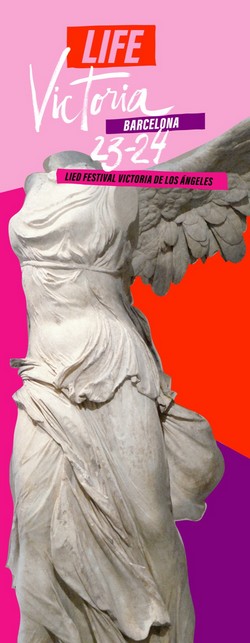Aurora Galán talks about a Lied by Strauss, Wasserrose, on a poem b Felix Dann. and chose the recording of Diana Damrau and Stephan Matthias Lademann. Thank you, Aurora!

It is the last song of the Mädchenblumen cycle (0p. 22), composed by Richard Strauss (1864-1949 and published in 1988. Based on the poem by Felix Dahn, it is a significant sample of the importance of the female figure within the romantic myth. The cycle talks about for types of flowers: Kornblumen (cornflowers), Mohnblumen (poppies), Epheu (Ivy) and Mädchenblumen (water lily).
The rhetorical play between the Donna and the flower is treated with condescension and admiration at the same time. On the one hand, it encourages the comparison between women and, on the other, it reflects the desire to connect with an eminently feminine nature. This idea connects with one of the main concerns of the romantic man: the split between human being and nature. Man appears as a distant being, a mere observer of everything that surrounds him and is unreachable, the beloved one, however, can enjoy this privilege. The individual wants to access the unity of the spirit through intuition and imagination: The All has a feminine essence.
A symbolic transcendence is born from the verses which is above any genre and incites a sensual magnetism that is longed for by the romantic man. Dahn talks about women as being of Deep foreboding thoughts […] imprisoned on earth. Is this nothing but the sign of a magnificence bordering on the divine? She is immeasurable beauty, mixture of fear and sweetness, described as a thin, ethereal, translucent and colourless being who uses the same language as nature. In the same way, Strauss creates a bucolic and mystical beginning using subtle chords displayed, leaving the leading role to the voice. The voice is born from the night thanks to the spell of the moon reflected on the pond.
Contextually, the many references to floral motifs, water and nature place this song within the Jugendstill or modernist movement in Germany. The first sings of this movement were in 1886 although it was consolidated in 1899. Richard Strauss absorbed these aesthetic premises and turned them into a self-aware style. According to Wayne Heisler, this is reflected in an exceptional way in his songs and his ballet-pantomime Josephslegende in the early 20th century.
The resignation of the human being before the inherent, the unattainable and the magical, appears constantly in the verses. Strauss recreates it very well through the birth of the flower So blüht sie, die zaub’rische Schwester der Sterne… (Then she blossoms, the magic sister of the stars…). A change in musical colour is observed towards a higher tonality. This symbolizes the desire to approach to the inaccessible things through a convoluted harmony. The birth of the flower/woman symbolizes the return to the origin and the triumph of truth.
In the middle of the Lied, when the poet says Wenn sie spricht… (when she speaks…), the composer uses majestic music to recreate another romantic myth illustrated by Argullon in his book El Héroe y el Único: the heroic self in romanticism. We observe the archetype of the lover. Their love and desire are the reaffirmation of the desire and identity. Rande des Teichs sich sehnet von ferne… (From afar, at the edge of the pond, he desires…).
Love passion is not Platonic but pleasant and sensual. The poet defines the real physical traits of the young woman, demonstrating a perfect knowledge of the types of women. He does not idealise it. Dahn speaks with knowledge: Wasserrose, so nenn’ ich die schlanke, nachtlock’ge Maid… (I call water lily of the night black-curled maidens…)
Through the twinning of the literary and musical arts, Strauss builds a subtle Lied, full of admiration and magic. It is a romantic recreation that evolves into new currents of thought.
Kennst du die Blume, die märchenhafte,
sagengefeierte Wasserrose?
Sie wiegt auf ätherischem, schlankem Schafte
das durchsicht'ge Haupt, das farbenlose,
sie blüht auf schilfigem Teich im Haine,
gehütet vom Schwan, der umkreiset sie einsam,
sie erschließt sich nur dem Mondenscheine,
mit dem ihr der silberne Schimmer gemeinsam:
so blüht sie, die zaub'rische Schwester der Sterne,
umschwärmt von der träumerisch dunklen Phaläne,
die am Rande des Teichs sich sehnet von ferne,
und sie nimmer erreicht, wie sehr sie sich sehne.
Wasserrose, so nenn' ich die schlanke,
nachtlock'ge Maid, alabastern von Wangen,
in dem Auge der ahnende tiefe Gedanke,
als sei sie ein Geist und auf Erden gefangen.
Wenn sie spricht, ist's wie silbernes Wogenrauschen,
wenn sie schweigt, ist's die ahnende Stille der Mondnacht;
sie scheint mit den Sternen Blicke zu tauschen,
deren Sprache die gleiche Natur sie gewohnt macht;
du kannst nie ermüden, in's Aug' ihr zu schau'n,
das die seidne, lange Wimper umsäumt hat,
und du glaubst, wie bezaubert von seligem Grau'n,
was je die Romantik von Elfen geträumt hat.
Do you know the flower, the fantastic
waterlily, celebrated in myth?
On a slim, ethereal stem bobs
its translucent, colorless head;
it blooms by reedy pools in groves,
protected by the swan, who circles it in solitary vigil;
it opens only in the moonlight
with which it shares its silver glimmer:
thus does it bloom, the magical sister of the star,
idolized for its dreamy, dark tendrils
which by the edge of the pool can be seen from afar,
never reaching what it years for.
Waterlily, so do I call the slim
maiden with night-dark locks and alabaster cheeks,
with deep foreboding thoughts showing in her eyes
as if they were ghosts imprisoned on Earth.
When she speaks, it is like the silvery rushing of water;
when she is silent, it is the pregnant silence of the moonlit night.
She seems to have exchanged radiant expressions with the stars,
whose language, of the same nature, she has grown accustomed to.
You can never grow weary of gazing in those eyes
fringed with silky, long lashes,
and you believe, as if blessedly, terrifyingly bewitched,
whatever the Romatics have dreamed about Elves.














Comments powered by CComment